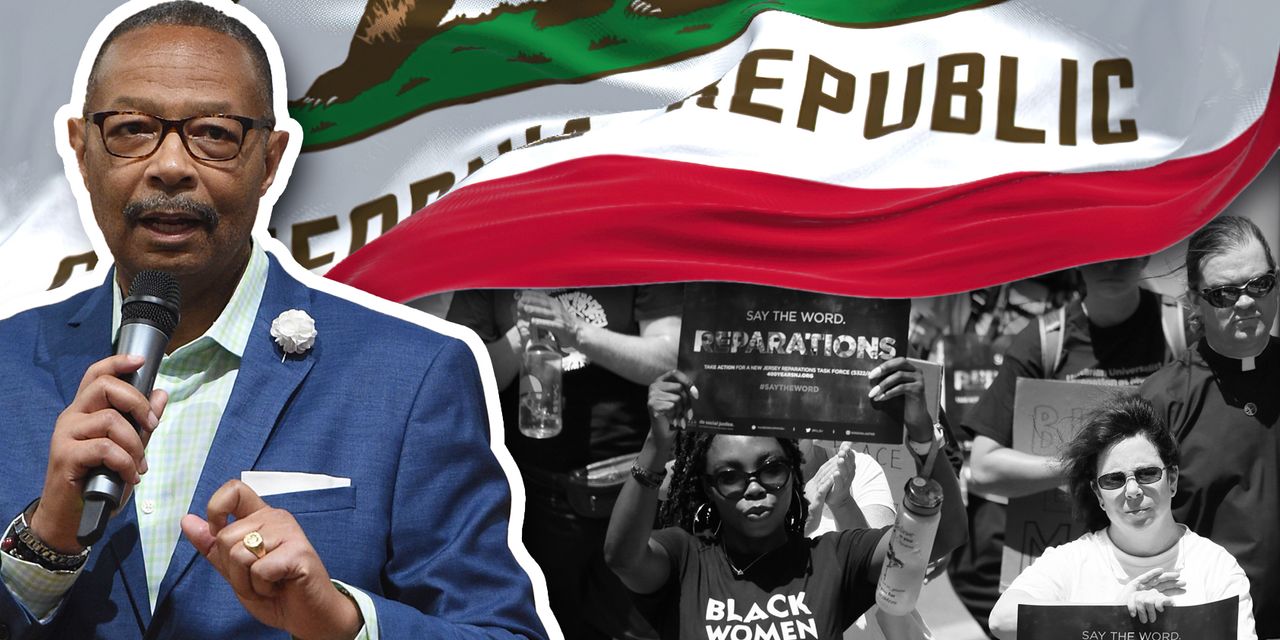California’s groundbreaking reparations task force is set to disband at the end of the month when it submits its final report to the legislature, but task-force member Reggie Jones-Sawyer’s work on its behalf will continue into next year.
That’s when the state assemblyman and his fellow task-force member State Sen. Steven Bradford will propose legislation to try to turn the group’s proposals into reality.
“For me, it’s the most thrilling and exciting part of this whole process,” Jones-Sawyer told MarketWatch on Thursday in an interview ahead of Juneteenth, adding that this next stage “will bear the most fruit.”
Read more: What is Juneteenth and why is it a holiday?
The two Democrats from Southern California could have their work cut out for them, despite their party controlling both houses of the state legislature. The task force’s recommendations are sweeping, and there seems to be less public support for reparations so far than the group would like.
The nine-member task force was formed as part of a 2020 law that established the first state-level reparations effort in the country. Last year, it released a preliminary report that detailed California’s history of participation in slavery — though it was not officially a slave state — and the state’s policies and actions that further discriminated against Black residents. The report the task force will release June 29 will contain its final proposals on how the state can repair those harms.
A recent poll by the Public Policy Institute of California found that only 39% of likely voters support the state having a reparations task force. On the other hand, 58% of likely voters said they strongly or somewhat support a formal apology by the state legislature and governor “for human rights violations and crimes against humanity on African slaves and their descendants.”
Also according to the poll of Californians, 66% of white residents, 57% of Asian Americans and 43% of Latinos had an unfavorable opinion of the task force.
See: California task force approves sweeping reparations potentially worth billions of dollars
Jones-Sawyer has said at the task force’s previous meetings that proponents of reparations will need “as many allies as possible.”
He further noted Thursday that “for any community that believes they have suffered similar atrocities, this report, and actions to come, should be seen as a blueprint for their efforts to ascertain and prove reparations are needed to atone for setbacks caused by historic and continual racism and bigotry.”
“It’s unclear exactly what, if any, reparations-related legislation will pass next year. But Jones-Sawyer is adamant that something will come out of the task force’s efforts.”
“It is important for everyone to read the two reports and the data, empirical evidence and history laid out in the preliminary and final report,” the assemblyman said. “They will discover, as members of the task force did, [that] the issue of reparations is complex with various pathways and types of atonement possibilities.”
Among the task force’s proposals is a new state agency modeled after the Freedmen’s Bureau, which was established by Congress to help freed enslaved people after the Civil War. The group envisions that the new Freedmen Affairs Agency would offer services and programs to the descendant community, including handling claims for reparations.
The agency is going to be key in seeing through reparations, which could come in the form of cash payments or a range of policy changes, Jones-Sawyer said.
“Like I always say, it’s never [just about] legislation and it’s always [about] implementation,” the assemblymember said. He noted that he and Bradford will be term-limited after next year, and that the agency will have to be structured so “that it will have the budget and be financed, but most important is longevity.”
Creating a new state agency would be expensive, as some members of the task force have pointed out. The timing isn’t great, either, as California faces a budget shortfall.
But Jones-Sawyer sounded optimistic about figuring out a way to pay for reparations with the help of experts, academics and the public. The task force heard from economists who suggested possible changes in tax laws, for example. “Some ideas will be ideas we never thought of,” he said.
From the archives (January 2023): How to pay for reparations in California? ‘Swollen’ wealth could replace ‘stolen’ wealth through taxes.
Fighting for civil rights is in Jones-Sawyer’s blood. He was born in Little Rock, Ark., in the 1950s as his uncle, Jefferson Thomas, and other Black students — known as the Little Rock Nine — were being integrated into an all-white school. Thomas was harassed, and Jones-Sawyer’s family received death threats. The assemblymember has recounted that people told his grandmother about him: “If you want that baby to live, you best move.”
It’s unclear exactly what, if any, reparations-related legislation will pass next year. But Jones-Sawyer is adamant that something will come out of the task force’s efforts. “Something as simple as an apology letter — I don’t see the legislature or the governor not doing anything.”
“I look for something to happen,” he added. “I don’t want to give up on us.”
Read the full article here













